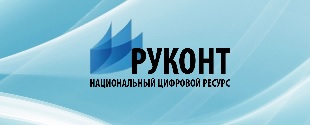ПРАКТИЧЕСКИЕ РЕКОМЕНДАЦИИ ПО ФОРМИРОВАНИЮ СБАЛАНСИРОВАННОЙ СИСТЕМЫ МОТИВАЦИИ ПЕРСОНАЛА РЕКЛАМНЫХ КОМПАНИЙ
Аннотация
На данном этапе развития в странах СНГ существенным фактором, который можно считать основой обеспечения благоприятной динамики становления экономико-социальной системы, является конкретное выявление и действенное освоение маркетингового инструментария управления персоналом рекламных кампаний в условиях цифровой экономики, потому что в быстроразвивающихся современных мировых условиях именно персонал представляет собой наиболее важное конкурентоспособное преимущество отечественных субъектов. Собственно, персонал и определяет конкурентоспособность организации, обеспечивает её экономическую и социальную выгоду, тем самым просматривается зависимость последнего результата деятельности от задействованности в трудовом процессе интеллектуального и квалификационного потенциала. В статье описаны конкретные методики для удержания компетентных работников, а также главные факторы мотивации, способствующие высокому уровню удержания сотрудников в рекламной индустрии (поддерживающее руководство, безопасный, приятный и приносящий удовлетворение рабочий климат). В работе также делается акцент на необходимости руководства в постоянном контроле уровня замотивированности своего персонала. Так как поддержание и повышение мотивации сотрудников может стать проблемой для компаний, поскольку не каждая задача будет интересна и увлекательна для тех, кто ее выполняет. Поэтому компании должны работать, чтобы найти способы поддерживать уровень мотивации своих сотрудников
Литература
Callahan S. New LinkedIn and 4A’s Research Shows Current Talent Trends for Advertising Agencies. https://business.linkedin.com/marketingsolutions/blog/linkedin-news/2016/new-linkedin-and-4as-research-shows-current-talenttrends-for-ad.
Agovino T. To Have and to Hold. https://www.shrm.org/hr-today/news/allthings-work/pages/to-have-and-to-hold.aspx.
Shevchik A.A. Formation of information and communication professional competencies of the personnel of advertis-ing companies. Herald BSEU. 2020. N 2. P. 17–25. (in Rus-sian).
Human Resource Management. University of Minnesota Libraries Publishing Edition. http://textbooks.whatcom.edu/bus230/.
Emmenegger P., Marx P. Business and the development of job security regulations: The case of Germany. Socio-Economic Review. 2011. N 9(4). P. 729-756. DOI: 10.1093/ser/mwr013.
Kobersy I.S., Barmuta K.A. The system of the methodological principles of management of enterprise development. Mediterranean Journal of Social Sciences. 2015. N 6(34). P. 25-30. DOI: 10.36941/mjss.10.36941/mjss
Miragaia D.A.M., Martins C.I.N. Corporate social responsibility, social entrepreneurship and sport programs to develop social capital at community level. International Review on Public and Nonprofit Marketing. 2015. N 12(2). P. 141-154.
Babiak K., Trendafilova S. CSR and environmental re-sponsibility: motives and pressures to adopt green management practices. Corporate Social Responsibility and Environmental Management. 2011. N 18(1). P. 11–24. DOI: 10.1002/csr.229.
Baron D.P. Corporate social responsibility and social entrepreneurship. Journal of Economics & Management Strategy. 2007. N 16(3). P. 683–717. DOI: 10.1111/j.1530-9134.2007.00154.x.
Phillips J.J., Edwards L. Managing Talent Retention. An ROI Approach. San Francisco: Pfeiffer. 2009. 124 p.
Reitman A. Talent Retention. Alexandria: American Association for Training & Development. 2007. 26 p.
Shevchik A. A. Improving the practice of personnel management in advertising companies. Herald BSEU. 2021. N 1. P. 56–63. (in Russian).
Garber P.R. Retention. Amherst: HRD Press, Inc. 2008. 50 p.
Grant A.M. Relational Job Design and the Motivation to Make a Prosocial Difference. Academy of Management Review. 2007. Vol.32. N 2. Р. 393–417. DOI: 10.5465/amr.2007. 24351328.
Shevchik A.A. Marketing in the digital economy. Materials of XXII International scientific conference of graduate students, undergraduates and students «Man, psychology, economics, law, management: problems and prospects». Minsk: Minsk Innovative University. 2019. P.85-86. (in Russian).
Nagibina N.I., Eljukina A.A. HR-Digital: digital technologies in human resource management. Bulletin of Eurasian Science. 2017. Т.9. N 1 (38). P.3-20. (in Russian).
Shevchik A.A. As the basis for increasing staff capacity in social personal organizations to manage the development of employees. Materials of the XI International scientific and practical conference «Problems of management of social development and humanitarian». Dnipro: National Academy of Public Administration under the President of Ukraine. 2017. P.185-187. (in Russian).
Zhudro M.K., Zhudro M.M. Economics of organizations. Workshop: tutorial. Minsk: High school. 2018. 319 р. (in Russian).
Shevchik A.A. Methods for identifying and quantifying the marketing competencies of advertising companies personnel in the digital economy. News of the Institute of Entrepreneurial Activity. 2021. N 1. P. 55–63. (in Russian).












